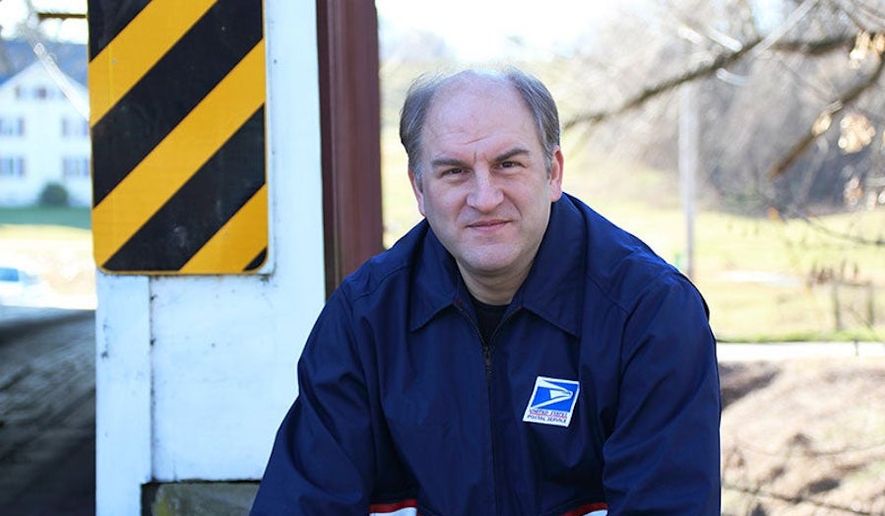Gerald Groff worked for seven years for the U.S. Postal Service, but it became a struggle to get his employer to accommodate his observance of Sundays for worship and rest in accordance with his evangelical Christian beliefs.
He was forced to resign in 2019 when the USPS office at Holtwood, Pennsylvania, told him that he would have to work on Sundays because of its obligation to deliver packages for Amazon. He filed a federal lawsuit, but lower courts ruled against him.
Mr. Groff’s legal battle now goes to the Supreme Court, which will hear arguments in his religious discrimination lawsuit on April 18.
He was transferred in 2016 to the Holtwood office, where he worked in fear of being fired for his religious observance. Before that, USPS skipped him in the work shift rotation, but Mr. Groff’s attorneys say he faced daily punishment short of firing.
“It was truly a very difficult and painful experience,” Mr. Groff said in an interview. “I lived for what we now know is two years or so, but I lived that whole time thinking, ‘Today could be the day you report to work and you’re fired.’ So it was very difficult to get up each day and report to the post office thinking today could be the day I am shown the door.”
He worked as a rural carrier associate, “a non-career employee who provides coverage for career employees whenever they are absent,” according to his court brief. Mr. Groff said he would work extra routes on Saturdays and holidays to ease the burden of co-workers who would pick up his Sunday shifts. He said some employees even wanted the extra hours.
SEE ALSO: Supreme Court to review 1977 decision on religious accommodation
“I actually had some of my fellow employees come up to me at times and say they cannot believe the post office is doing this,” said Mr. Groff, whose original complaint asked the district court to award compensation for unlawful conduct and back pay and to enjoin the post office from religious discrimination.
The 3rd U.S. Circuit Court of Appeals sided in May with USPS by ruling that the small post office was unduly burdened by accommodating Mr. Groff.
At the Supreme Court, at least four justices, whose identities were not divulged, voted in favor of taking up the Groff appeal.
At least three justices on the conservative wing of the court — Justices Neil M. Gorsuch, Clarence Thomas and Samuel A. Alito Jr. — have signaled they want to revisit the precedent Trans World Airlines Inc. v. Hardison on religious accommodations in the workplace.
In the landmark 1977 case, the high court ruled that an employer could deny religious accommodation if it would cause even a minor hardship on the business.
In Mr. Groff’s dispute, the federal government urged the justices not to take up the case. It argued that the Holtwood office was so small that skipping Mr. Groff in Sunday rotation sometimes meant the postmaster himself had to deliver packages on Sundays.
“That is hardly ‘normal,’” the U.S. solicitor general argued in the government’s filing.
The government said in its court filing that the workflow was disrupted at the rural post office.
A spokesperson for the Justice Department did not respond to a request for comment.
The justices will decide what level of burden — if any — an employer can place on an employee’s religious practice so as not to run afoul of Title VII of the Civil Rights Act of 1964. They also will decide whether extra work on fellow employees counts as a hardship that burdens the employer as a whole so as to warrant the denial of a religious accommodation.
Randall Wenger, chief counsel with the Independence Law Center, which is representing Mr. Groff along with First Liberty Institute, Baker Botts, Church State Council, noted that when the law was written, a senator spoke out about the importance of respecting his Sabbath, which he observed on Saturday.
Mr. Wenger said a ruling for Mr. Groff would help people of all religions.
“Having a standard in place that allows you to live out your faith in the workplace, it is going to benefit everyone,” the lawyer said. “Since 1977, courts have been getting this issue wrong and really undercutting the ability of employees to be able to live out their faith in the workplace and to simply be able to follow their conscience.”
The case is Groff v. DeJoy. A ruling is expected by the end of June.
• Alex Swoyer can be reached at aswoyer@washingtontimes.com.




Please read our comment policy before commenting.